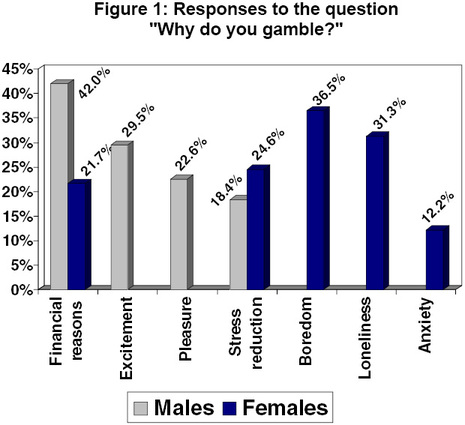The WAGER Vol. 5(27) – Stress, Anxiety, & Why Gamblers Gamble
Why do gamblers gamble? In 1998, the WAGER presented possible answers to this question gleaned from a telephone survey of 1522 randomly selected American adults. The most frequent reponses included "to make money" (50.5%), "for entertainment" (33.4%), "for excitement" (18.4%), and "for curiosity" (10.6%). [see WAGER 3(1)]. In 1996, Coman, Burrows, and Evans (1997) set out to conduct a similar study to answer the same question. [1]
In September 1996, the Addiction Research Institute (ARI) in Melbourne, Australia received 720 calls to its ‘G-line.’ The G-line is a confidential telephone service offering counselling and treatment referrals for problem gamblers and their families. Of the total 720 calls, 234 were from problem gamblers. During the course of the call, G-line staff queried callers about their reasons for gambling. The aggregate results from the study are presented in figure 1. The results are stratified by gender, although only a limited amount of stratified findings are reported by the authors.
Citing the frequency of the "excitement," "stress reduction," and "anxiety" responses, the authors propose that stress and tension are major motivations for problem gambling. They discuss the existence of a multistage cycle of stress. First, the central nervous system of the problem gambler becomes habituated to the gambling behavior. Once habituated, the gambler experiences stress and tension when not gambling. To relieve the stress and tension, the gambler continues to gamble.
Changes in stress levels are accompanied by changes in the body’s chemistry. In particular, levels of cortisol and neurotransmitters such as norepinephrine are sensitive to both external and internal stressors. Blood pressure, pulse, and breathing rates may also be affected. The present study may help inform future research that investigates the relationship between physiology and problem gambling.
The validity of this stress-reduction model cannot be validated solely on the authors’ telephone survey. Nevertheless, the present study provides important insight into the self-reported motivations of problem gamblers.
References
Coman, G.J., Burrows, G.D., and Evans, B.J. (1997). Stress and anxiety as factors in the onset of problem gambling: Implications for treatment. Stress Medicine, 13, 235-244.
